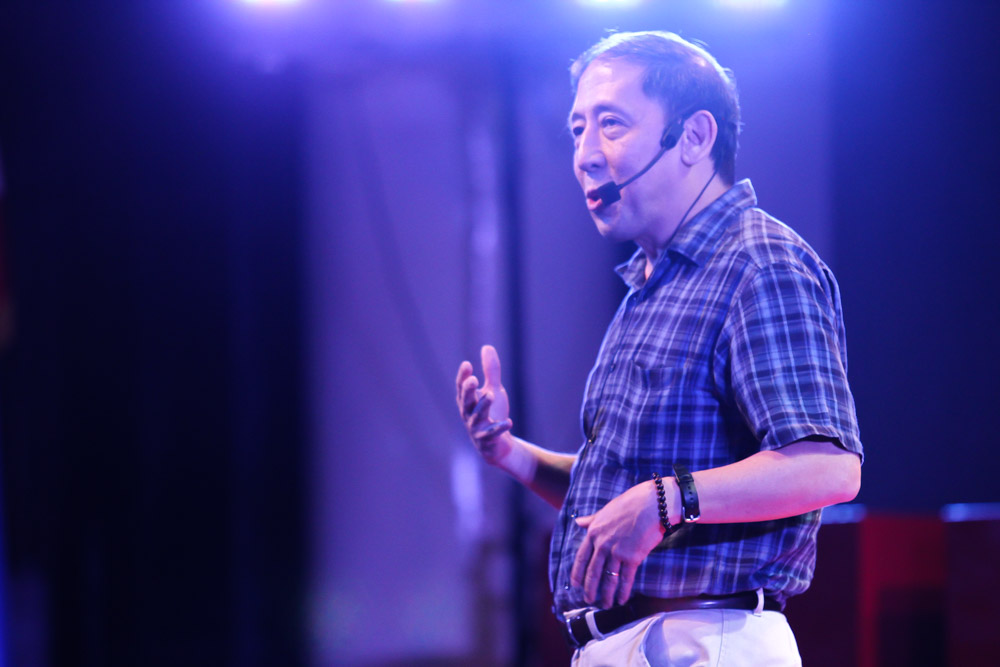SIX SPEAKERS from different backgrounds tackled and explored how the collective “we” can benefit society at TEDxADMU: Why Coordinate.
TEDx talks, according to the official website, are independently organized events held by individuals or groups designed to “spark deep conversation and connections at the local level.”
This year’s TEDxADMU, in particular, sought to emphasize the intrinsic connection of people with one another and to empower everyone toward nation-building.
The speakers were Mathematics Department Professor Queena Lee-Chua, PhD, Theology Department Assistant Professor Roberto Guevara, PhD, Simbahang Lingkod ng Bayan Political Officer Enrico La Viña, musician Jim Paredes, Kalibrr Chief Executive Officer Paul Rivera and gender rights activist Julian Tanaka.
The series of talks, the third installation of TEDxADMU organized by the Ateneo Junior Marketing Association (AJMA), was held at the Henry Lee Irwin Theater on February 21.
AJMA is an accredited business cluster organization of the Council of Organizations of the Ateneo.
Breaking the status quo
Paredes, Lee-Chua and Rivera emphasized deviating from conventions with collective action.
Paredes, a former member of Filipino music group Apolinario Mabini Hiking Society, stressed the importance of developing a national identity for Filipino music that could be promoted and enjoyed by the rest of the world.
“Let’s make as much OPM (Original Pilipino Music) as we can, coming from different parts of the Philippines, until we can develop our own music,” he said.
Paredes discouraged OPM that was heavily influenced by foreign artists, saying that in performing around the world, foreigners enjoyed more when he sang in Filipino vis-à-vis in English.
“If you want to make it in the world, come as a Filipino. Come as you are,” Paredes added.
In her talk, Lee-Chua used game theory to explain how people make rational choices, with the People Power Revolution as a primary example.
The People Power Revolution, which occurred on February 25, 1986, is a political movement that led to the ouster of former President Ferdinand Marcos.
“Mathematics predicted People Power. The rational choice for us civilians was to stay [in EDSA] and the rational choice for soldiers was to attack,” Lee-Chua said.
She added that if the civilians chose to leave EDSA as they were ordered, it would have represented a return to the status quo.
“The dictator would have still been in power and that would have been the worst outcome, worse than dying on EDSA itself,” she said.
Lee-Chua then called on the audience to subsequently deviate from the status quo and make the rational choice should the need arise.
“I know that if ever the time comes out to do what is right, you guys and girls and all colours in between will step up and save our country, and keep fear away from our shores,” she said.
Moreover, Rivera talked about his experience of rising from an underprivileged background with hard work and business networks.
“If you look at the statistics and trends, I’m not supposed to be here,” he said, referring both to his speech and his life in general.
Rivera then challenged the audience to engage in business to enact social change, citing his business Kalibrr, which is an online platform that matches workers and jobs.
“Be inspired by something more than profit,” Rivera added.
Reaching out to the marginalized
La Viña, Tanaka and Guevara focused their talks on how collective action can empower the marginalized.
La Viña discussed the difficulty posed by differences when coordinating with the marginalized.
“Maybe the enemy isn’t hatred, but fear towards the unknown—fear towards what is different from what we know,” he said.
He cited his experience with the farmers affected by the Aurora Pacific Economic Zone and Freeport (Apeco), wherein he did not fully understand the reasons behind his passion for the farmers inspite of his convictions.
La Viña then emphasized collective action with the people being fought for. “We must speak with, work with and be with the marginalized instead of speaking for, working for and being for them.”
Moreover, Tanaka, the first openly transgender male to win a seat in the student council of the University of the Philippines-Diliman (UPD), spoke about his experiences transitioning between genders in the face of his greater passions.
“I felt that my transition could wait,” Tanaka said, as he recalled receiving an opportunity to play softball abroad.
Tanaka is appreciative of the liberal environment of UPD but was worried about how people like him were being treated outside the campus.
“When I get out there in the real world, who protects me? [The] anti-discrimination bill still hasn’t been passed,” Tanaka added.
Tanaka then called on everyone to use their capacities to protect individual freedom and equality. “Don’t you think we have the power to protect each other? Don’t we have the power to protect ourselves as individuals?”
For his part, Guevara emphasized that service to the poor requires knowing the poor deeply and being close to the realities they face.
“You cannot connect with someone you do not know. You cannot love someone whom you have not gotten to know,” Guevara added.
He also pointed out how the poor teach consideration for others, citing his experience of bringing students to an Aetan settlement where equal distribution of land and other resources is practiced.
“For [the Aetans], when we harvest more than what a family needs, we are depriving other members of the community of what they are entitled to,” Guevara said.
He adds that interacting and connecting with the poor can lead to better self-awareness. “The poor connect us to our deepest, truest selves.”








Jim Paredes’s group was once known as the Apolinario Mabini Hiking Society but had to change their name to APO Hiking Society after objections to the name which seemed to make fun of Mabini’s disability. I haven’t heard them referred to as such in decades and was surprised to see it again here.